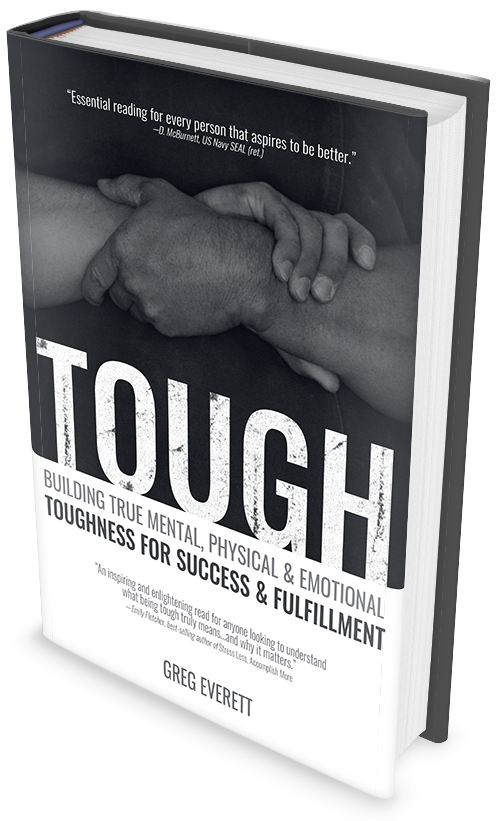No matter our individual level of social interaction, we are by our nature and universal circumstances inextricably linked to the rest of the world. What matters ultimately is not the quantity of social interaction, but the quality—more specifically, our treatment of and consideration for those we’re interacting with. The origins of the maxim are unclear—likely because it’s a fairly obvious sentiment that could have been arrived at by multiple people independently at different times—but the underlying wisdom is simple: Character can be judged by how you treat those from whom you have nothing to gain. Muhammad Ali expressed the idea clearly when he said, “I don’t trust anyone who’s nice to me but rude to the waiter. Because I know they would treat me the same way if I were in that position.”
The nature of our treatment of people shouldn’t be dependent on our potential to gain something from them. Being truly tough means that we feel no need to treat others in any other way but respectfully and considerately—because we have nothing to prove, no concern for our appearance, and no need for posturing—unless and until someone has demonstrated our respect and consideration are unmerited. This is not to say we operate naively or are trusting to a degree of risk. Interacting respectfully with people doesn’t leave us vulnerable in any way. It has no bearing on our ability to defend against manipulation, attack or anything else we need to remain vigilant against. It’s a strictly outward motion.
Whether conscious or not, our decisions to not be kind, considerate or generous nearly always arise out of an inclination to protect ourselves. We often believe kindness to be a display of vulnerability that may make us appear susceptible to attack or exploitation or, oddly enough, embarrassment. The callous, aloof attitude of the classic tough guy persona is a protective measure against any potential betrayal of weaknesses. This is a misinterpretation of the signals kindness emits, of course—it in fact communicates confidence and security to anyone with a reasonably developed understanding of interpersonal interaction.
Even if respect and consideration for others is our default for good reason, it’s by no means unconditional. It’s only rational that our interactions with others be dependent on their character, behavior and choices. Continued kindness and generosity to those who have demonstrated ill will, malicious purposes or intent to harm us is senseless and potentially dangerous. Kindness and respect should be reserved for the deserving with the assumption that everyone is until they provide evidence to the contrary.
This doesn’t necessarily mean we eliminate empathy or compassion for those to whom we no longer, by virtue of their own choices, extend kindness and generosity. We can simultaneously be empathetic out of the recognition of the basic human condition and how circumstances may affect people’s beliefs and behaviors, and be indifferent toward them. In other words, the choice to cease being kind to someone isn’t a trigger to hate or disdain them; it’s no more than the elimination of the previous kindness.
Critically, this is the most beneficial approach we can take—it eliminates not just vulnerability to someone likely to exploit it, but also all time and energy investment into the person. Hatred is an active condition—because it demands our ongoing energy and time and focus, it allows its object power over us, and consequently does us more harm in many ways than it could ever do its target. Indifference, on the other hand, is the condition of absolute nothingness with regard to the object. There is no feeling, no thought, no action. Interestingly enough, this is often a far worse response than hatred or anger to its target. Very little upsets someone more than the knowledge that they’re absolutely meaningless and inconsequential to the individual from whom they’re desperate to elicit a response. This approach is simultaneously most protective for ourselves and effective against the other.
Our personal choices and the manner in which we live have far-reaching effects on the world around us even in the absence of intentional attempts to influence others. The Flynn effect, named for social scientist Jim Flynn, describes the way in which individuals’ improvements in their own abilities naturally drive collective improvements in the same abilities of the surrounding community. We can see this phenomenon in any number of circumstances, from global IQ increases (Flynn’s original focus), to a specific team of athletes whose individual performance improvements drive increasing performance of his or her teammates through competitiveness, inspiration, methodological learning, encouragement and behavior modeling.
If our behavior and attitude influence the same of those we encounter throughout our lives, unless we’re completely isolated from all of humanity indefinitely, we have to accept a degree of accountability for the state of the world. Being tough means not only recognizing and accepting this responsibility, but choosing to use it for valuable and positive effect

